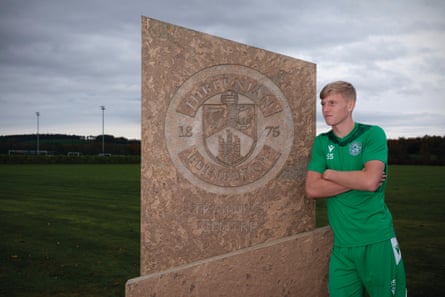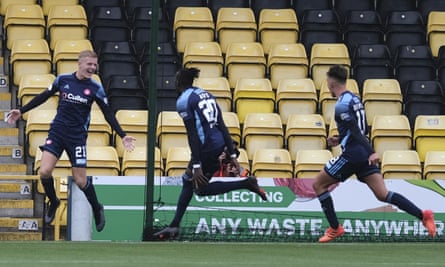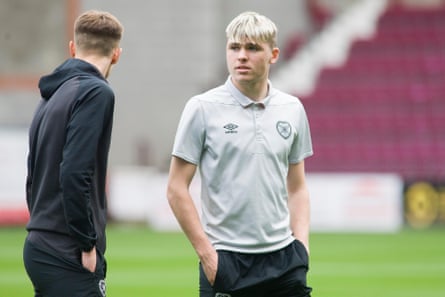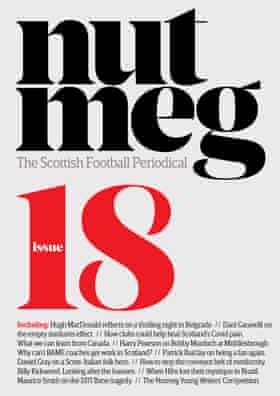It is the dream that has sustained you through many a sodden Saturday. Your first senior start. The roar of a crowd. Now, it is one blow of the referee’s whistle from becoming a reality. You are standing in the tunnel, a breeze gusting round your ears, your limbs pulsing like fibre optic cables. Before you lies the pitch. You clench your fists, raise your head and run out into … silence.
The German word for football played behind closed doors is Geisterspiele or ghost stadiums. Thanks to Covid, cacophonous cathedrals have been transformed into echoey hangars. Gone are the cheering and the jeering; the clamour and the cussing. There is no Fratellis blaring from the Tannoy, or shouts of “ Where’s your guide dog?” at the linesman. No mass rising of fans, like startled birds, as the ball hurtles towards the net; and no gruff threnody as it is skied over the bar. In some grounds, cardboard fans cut spectral figures in desolate stands, while canned oohing and ahh-ing heightens the air of unreality.
“It’s eerie,” says 18-year-old Josh Doig, who scored his first senior goal for Hibs in a friendly at Parkhead, shortly after football resumed in July. Doig, a left-back, put his team in front after 15 minutes. Look closely at the footage and you can see him – a tiny figure in a vast arena – hovering near the edge of the box, then volleying the ball into the bottom right hand corner. A dazzling achievement, marked with a couple of diffident high-fives. “I wanted to do a massive knee-slide at the corner flag but obviously I couldn’t.”
The age of the Geisterspiele is tough on fans for whom going to the game is a sacred ritual. It is tough on the managers being asked to deliver results with depleted resources. But it is toughest on those teenagers, such as Doig, on the cusp of glory, playing their first big season on a phantom field of phantom dreams.

“To sit in a dugout without fans is surreal,” says George Cairns, head of youth for Hamilton Academical. “There are days you hear the referee blow the whistle and you think: is this game really happening?” Hamilton’s first league match of the season was at Celtic Park. Performed to no one, the ceremonies to fête last year’s champions were stripped of significance. The guard of honour, the positioning of the trophy on the centre spot, the letting off of a handful of fireworks were little more than a going-through of the motions, as players looked awkwardly on. “It was strange to see Celtic unfolding the flag in an empty stadium,” Cairns says.
He feels sorry for the young players, who triumphed over adversity only to have Covid rob them of their prize; and for the families, who cheered them on through rainy days, only to miss out on their moment in the sun. “When these young lads make their debut, or score their first senior goal, they will immediately look for a mother or father, a sister or brother, a granny or a grandpa, but there’s no one there, just the coaches and the other players,” he says. “I know everyone is in the same predicament, but it’s still a shame for them, and a tough environment to play in.”
It’s an environment of constant uncertainty. “So what, isn’t it always?” you might say. Young players are only ever a few below-par games away from being dropped. By the time they reach the first team they will have tholed myriad setbacks. Doig had spent seven years with the Hearts Academy when he was told he should find another team. Injuries may strike just as they are hitting their stride: a groin strain, a pulled hamstring, the misery of a broken metatarsal. But Covid has amped up the stress and disappointment.
Tests twice a week are a burden as well as a privilege. “Everyone thinks it’s great they are being tested, and of course it is, but the tests are unpleasant, and then they spend the next 24 hours worrying if they are negative,” Cairns says. They feel a sense of responsibility not only to themselves and their families, but also to their teammates. “And of course, if they test positive, they have to self-isolate for 14 days – that’s 14 days they cannot train.”
The pandemic magnifies the sport’s highs and lows, as Kyle Munro – aka The Bull – will tell you. Munro, also 18, is a rising star at Hamilton. Scouted by Celtic from Clydebank Boys’ Club at Under-11s, he was dropped after a year. He returned to Clydebank, but was quickly picked up by Dumbarton. Then Dumbarton ran into financial difficulties and its youth operation folded.

Back at Clydebank for a third time, Munro resolved to play for the fun of it; but he was scoring hat-tricks every week. By the time Hamilton came knocking, he had several offers. “I chose Hamilton because they are so good at bringing the youth through,” he says. Munro was 15 then. When he turned 16, he was offered a professional contract.
In 2018, Munro – now a left-back – played in the home-leg of the Uefa Youth League against Basel. The club had given away free tickets so the home stand was full. Hamilton were 2-1 down, until Sean Slaven scored with the last kick of the match, making an aggregate of 4-4. It went to penalties before Accies prevailed. The crowd went crazy. “I still watch the video of that final goal,” he says.
Last season, Munro was out on loan to Clydebank. He came back to Hamilton in time to play a handful of games for the reserves before lockdown. While on furlough, manager Brian Rice phoned him to tell him he was putting him in the first-team squad the following season. On 29 August, he was on the bench for the home game against Rangers, the team his family supports, when Scott McMann was sent off. “I was thinking, hopefully it’ll be me, hopefully it’ll be me,’” Munro says. “Then the gaffer shouted, and it was me, and I couldn’t believe it. To make my debut against Rangers. I was buzzing.”
Munro was on a roll. With McMann suspended, he was chosen to start the next match away to Livingston. With five minutes to go, and the score at 1-1 … well, I’ll let him tell you. “There was a free-kick. I wanted to take it, but the gaffer was screaming: ‘Get in the box, get in the box’, so I went into the box, and then, funnily enough, round the back post, it comes right to me. As soon as I scored, I looked at the linesman thinking: ‘Am I offside?’ But the flag didn’t go up. I didn’t know what to do. I just saw everybody running towards me, and I had scored the winner.”
What happened next proved controversial. In the desire to celebrate a fellow player’s success, a number of teammates piled on in a non-socially distanced fashion. “They shouldn’t have done that but you just don’t think,” Cairns says. “To score the winning goal on your first start is amazing – passions were running high.”
The safety breach might have gone unremarked if Munro hadn’t tested positive for Covid two days later. Although he had no symptoms, he had to self-isolate along with his father, mother, brother and the players involved in the pile-on. “To go from scoring my first senior goal on the Saturday to testing positive on the Monday was the biggest comedown ever,” he says. “My family was raging – though it wasn’t my fault – and I spent the time worrying: is that me lost my place in the team?”
In the end, Munro did start against Dundee United – the first match after he came out of isolation, and he has been in and out of the team ever since. But lessons were learned. “I got a picture taken – I was giving him a hug after the game – and that went viral,” Cairns says. “They were saying: ‘You shouldn’t have hugged him,’ but it was an instinctive reaction. We’ve had to stop that now, and the celebrations. It’s sad, but that’s the way it’s got to be.”
Back at the start of the new season – before Marcus Rashford single-handedly atoned for the sins of the entire footballing fraternity – players were being painted as the bad boys of the pandemic; entitled young men who believed the rules did not apply to them. Eight Aberdeen players were castigated by first minister Nicola Sturgeon after they went on an unofficial “team night out” to a city bar; two of them tested positive and all eight were forced to self-isolate. Then, to compound the shame, Celtic player Boli Bolingoli sneaked off to Spain, then played against Kilmarnock without quarantining.
However, for most young players, the months since March have been as fraught as for everyone else. While the job they do comes with many advantages, it also comes with its own specific challenges. Unable to train with their teammates during lockdown, the players had to find the means and motivation to keep fit. “In one sense, it was easy because the only thing you could do was go out and run and play football, but trying to motivate yourself over a long period of time was tough,” says Munro. “When you are with someone else you want to do better than them, but when you are just doing it yourself you want to stop when you are tired.”
Doig has gym equipment in his garage, and says he’s good with self-discipline. “But some days you would wake up and think: there’s no date to go back – what’s the point, nothing’s going to come of it. Those were the days you had to dig deep.”
Connor Smith, 18, currently on loan to Arbroath from Hearts, was luckier than some. His older brother Callum plays for Hamilton, so the two of them could train together at a nearby park. And their father used to play junior football. “He knows what me and Callum need to do to progress,” Smith says. “He used to take us running through lockdown. After that I felt fitter than anything.”

Since lockdown, however, life has become lonelier. Smith, who has to travel between Hearts and Arbroath, has moved out to a flat, which he shares with a Dunfermline player. It has its bonuses but he misses the old post-match family debriefs. “It used to be that one [of my parents] would go to my brother’s match, one would go to mine, then we would go back to the house,” he says. “It was always best when both of us had won. Other times one of us would be happy, the other raging.” What would happen then? “We would wind each other up,” he laughs, then stops. “No, we did try to help each other.”
Since Covid, their parents can only watch them play via the teams’ live streams. And Smith cannot go to his family home. He meets his mum for the occasional coffee. “There was a friendly the other week, and my dad asked the manager if he could stand behind the gate and watch from there,” he says. “I spoke to him after that.”
At the clubs, the atmosphere is subdued. Munro and Doig have moved up, but they have been unable to spend much time getting to know the older players. Early on the teams were split between home and away dressing rooms for social distancing purposes and, even now, there’s not much opportunity for banter. “You try to make the most of the time you have with them but it’s just breakfast, train and go home,” Doig says.
The young players are also hyper-aware of the extra scrutiny that falls on them as footballers. They see people eyeing them up on the street. They know their Instagram accounts will be trawled for evidence of rule-breaking in a way their peers’ are not. So, they worry about doing anything that might be misconstrued. “Sometimes my flatmate and I go to Asda: that’s how bored we are,” Smith says. All Doig does is eat, sleep, train, repeat. “All eyes are on football. My worst nightmare is to wake up to the headline: ‘Josh Doig doesn’t care about the elderly,’” he says.
When I speak to him, Doig is on the last day of a fortnight’s self-isolation. He was in the ill-fated under-19s Scotland squad whose friendly against England was called off mid-game in October. Another crushing disappointment.
“I was delighted when I was told I was in the team,” he says. “There was a boy from Hearts I was pally with who was picked as well, so I texted him and said: ‘We’ll get a room together’, but then, of course, we were told it was individual rooms, and we weren’t allowed to leave them, which was frustrating because, when you go away, you are supposed to be bonding.”
Despite this, the trip got off to a good start. The squad had two training sessions at the FA’s state-of-the-art facilities at St George’s Park in Staffordshire. The game itself was less promising. Half an hour in, Scotland were already 2-1 down when one of their players got sent off. England scored a third, but then the referee blew the whistle, stopping play. The teams were told to sit down on the pitch. No one knew what was going on. “At first I thought it was a bomb scare,” Doig says. Then Scotland’s Covid officer went round telling them someone had tested positive. “Our coach [Billy Stark] was standing on the hill away from everyone with this big mask on, so everyone clocked right away who it was.”
The dramatic intervention came because the test result, which was supposed to have arrived earlier in the day, had been delayed. The players were taken to their hotel and given 20 minutes to collect their things before getting back on the coach and going home. They were gutted.

Now Doig, who has been gaining in confidence, is fretful again. His is the distinctive cry of the fledgling: “Will I start? Will I start? Will I start?” But – like everyone else – his expectations have been managed; his dreams downsized. For the moment he is just looking forward to stepping over the threshold. “To take a drive, to feel the air, to have a bit of freedom.”
He’s an optimist too. He looks to a day beyond the pandemic, when he can reclaim the rites of passage Covid has snatched away. Doig made his competitive debut at the opening game of the season: Hibernian 2-1 Kilmarnock. A great victory on home turf. But what is football without the fans? “I know it wasn’t the full experience,” he says. “But there is time yet. Hopefully I will have a long career.”
• This article appeared first in Nutmeg magazine
• Follow Nutmeg on Facebook, Twitter and Soundcloud
• Follow Dani Garavelli on Twitter
Source link